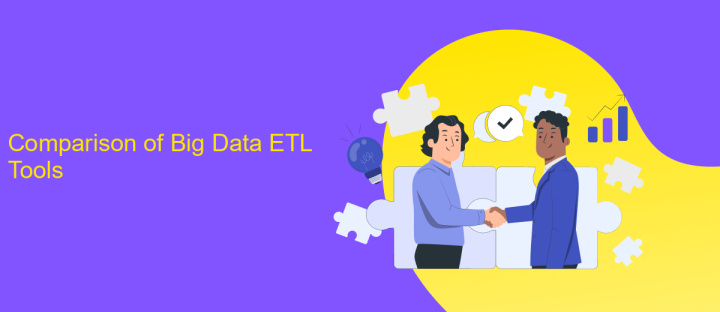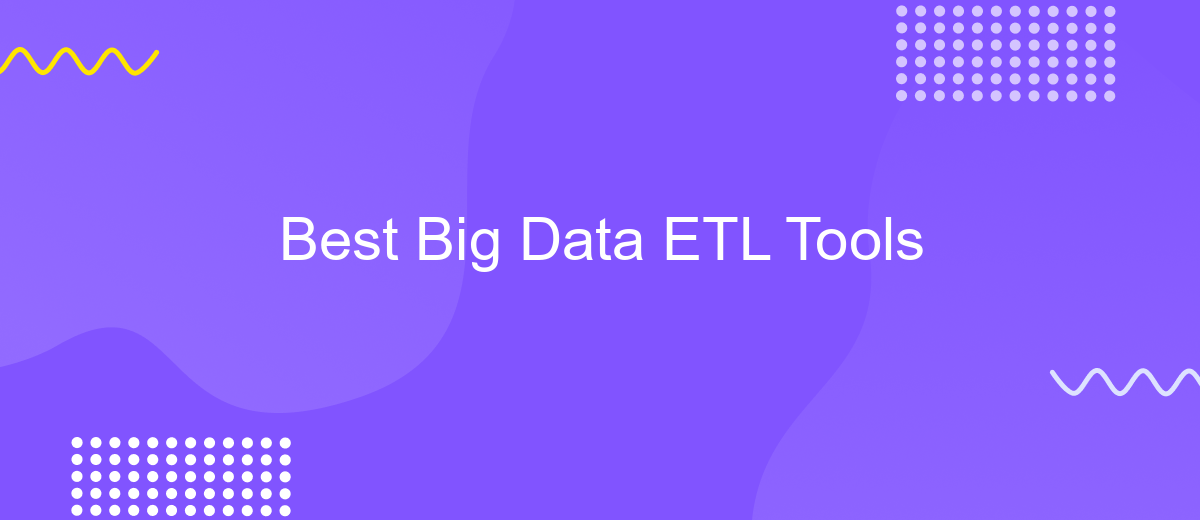Best Big Data ETL Tools
In today's data-driven world, extracting, transforming, and loading (ETL) processes are crucial for managing vast amounts of information. Big Data ETL tools streamline these tasks, enabling businesses to efficiently handle and analyze data from multiple sources. This article explores the best Big Data ETL tools available, highlighting their key features, benefits, and how they can enhance your data management strategy.
Introduction
In the era of big data, organizations are inundated with vast amounts of information from various sources. Efficiently extracting, transforming, and loading (ETL) this data is crucial for gaining actionable insights and making informed decisions. Choosing the right ETL tool can significantly streamline these processes, ensuring data accuracy and reliability.
- Seamless data integration from multiple sources.
- Automated data transformation and cleaning.
- Scalability to handle growing data volumes.
- Real-time data processing capabilities.
- User-friendly interface and robust support.
One notable tool in this domain is ApiX-Drive, which excels in automating integrations and simplifying data workflows. By leveraging such tools, businesses can focus more on analyzing data rather than managing it. This article explores some of the best big data ETL tools available today, highlighting their features and benefits to help you make an informed choice.
Comparison of Big Data ETL Tools

When comparing Big Data ETL tools, it is essential to consider various factors such as ease of use, scalability, and integration capabilities. Tools like Apache NiFi and Talend are known for their user-friendly interfaces and robust feature sets, making them ideal for both beginners and advanced users. On the other hand, Apache Spark stands out for its exceptional performance and scalability, particularly in handling large datasets. Each tool has its strengths and weaknesses, so the best choice often depends on the specific requirements of a project.
Another crucial aspect to consider is the ability to integrate with other systems and services. For instance, tools like ApiX-Drive can significantly simplify the integration process by providing pre-built connectors and automation features. This can save valuable time and resources, allowing teams to focus on data analysis rather than data integration. Ultimately, the right Big Data ETL tool should offer a balanced combination of usability, performance, and integration capabilities to meet the diverse needs of modern data-driven enterprises.
Features to Consider

When selecting a Big Data ETL tool, it's essential to evaluate several key features to ensure it meets your organization's needs. These features help streamline data integration, transformation, and loading processes, making your data workflows more efficient and reliable.
- Scalability: The tool should handle growing data volumes and complex transformations without compromising performance.
- Integration Capabilities: Look for tools that easily integrate with various data sources, including databases, cloud storage, and APIs. Services like ApiX-Drive can simplify these integrations, enabling seamless data flow between systems.
- Usability: A user-friendly interface and comprehensive documentation are crucial for reducing the learning curve and facilitating smooth operations.
- Automation: The ability to schedule and automate ETL processes minimizes manual intervention and reduces the risk of errors.
- Data Quality: Ensure the tool provides robust data validation and cleansing features to maintain high data quality standards.
Choosing the right ETL tool involves balancing these features based on your specific requirements. By carefully considering these aspects, you can select a tool that enhances your data management capabilities and supports your business objectives.
Case Studies and Success Stories

Many organizations have successfully implemented Big Data ETL tools to streamline their data processing workflows and gain valuable insights. One notable example is a leading e-commerce company that leveraged an ETL tool to integrate and analyze customer behavior data from multiple sources, resulting in a 20% increase in sales.
Another success story comes from a healthcare provider that utilized an ETL tool to consolidate patient records from various systems, improving patient care and operational efficiency. The integration of these records allowed for better diagnosis and treatment plans, ultimately enhancing patient outcomes.
- A financial services firm used an ETL tool to merge transactional data from different branches, reducing reporting time by 50%.
- A retail chain implemented an ETL solution to analyze inventory data, optimizing stock levels and reducing waste by 15%.
- A telecommunications company employed an ETL tool to process call data records, improving network performance and customer satisfaction.
Additionally, services like ApiX-Drive have been instrumental in setting up seamless integrations between various data sources and ETL tools. By automating data transfers, ApiX-Drive has helped companies save time and reduce errors, further enhancing the efficiency of their ETL processes.


Conclusion
In conclusion, selecting the right Big Data ETL tool is crucial for efficiently managing and processing large volumes of data. Each tool offers unique features and capabilities, making it essential to align your choice with your specific business needs and technical requirements. From open-source options like Apache NiFi to comprehensive commercial solutions, there is a wide array of tools designed to handle diverse data integration tasks.
Moreover, leveraging services like ApiX-Drive can further streamline the integration process, enabling seamless connectivity between various data sources and destinations. ApiX-Drive simplifies the automation of data workflows, ensuring that your ETL processes are both efficient and reliable. By carefully evaluating your options and considering the integration capabilities of tools and services, you can optimize your data management strategy and drive more informed decision-making within your organization.
FAQ
What are the best ETL tools for Big Data?
How do ETL tools handle data transformation?
What factors should I consider when choosing an ETL tool?
How can I automate ETL processes?
Are there any open-source ETL tools for Big Data?
Routine tasks take a lot of time from employees? Do they burn out, do not have enough working day for the main duties and important things? Do you understand that the only way out of this situation in modern realities is automation? Try Apix-Drive for free and make sure that the online connector in 5 minutes of setting up integration will remove a significant part of the routine from your life and free up time for you and your employees.

